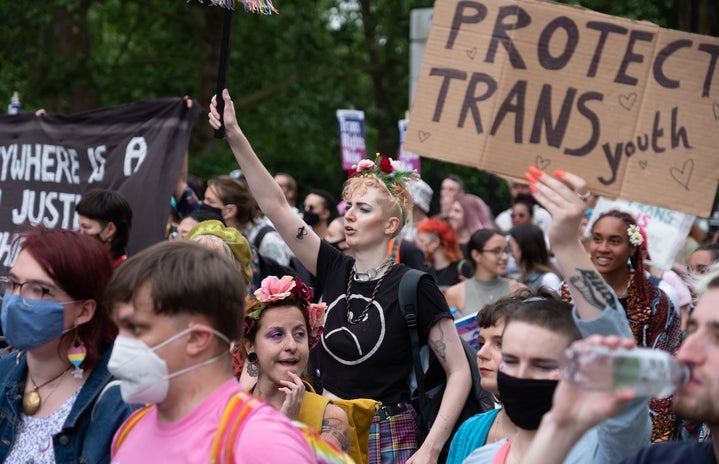Senate Bill 254 and House Bill 1421 pose significant barriers to health care for transgender people.
Currently, there are 452 anti-LGBTQ bills in state legislatures within the United States. In Florida, there are 10. Two of these bills, Senate Bill 254 and House Bill 1421, limit transgender people’s access to gender-affirming health care.
The Anti-Trans Health care Bills
SB254 will limit access to gender-affirming health care for transgender youth and adults alike. If passed, the bill would prohibit Medicare from covering costs of gender-affirming health care for transgender youth or adults, prohibit the use of public funds (including funds of a public university, public hospital, city, or county) to provide benefits that include gender-affirming health care for transgender people of all ages, and allow courts in Florida to claim temporary emergency jurisdiction to take physical custody over a minor who is receiving gender-affirming health care. In addition, it would require hospitals to provide a declaration that states that the hospital does not offer gender-affirming health care to minors and will not refer such patients to other providers for gender-affirming health care. If a hospital does not provide this attestation, its license will be revoked. The bill also states that physicians, nurses, and other health care practitioners can be criminally charged with a third-degree felony if they provide gender-affirming health care to a transgender minor. The Florida Senate passed the bill and now awaits a vote in the Florida House of Representatives.
HB1421, SB254’s companion bill, further limits access to health care for transgender people. If passed, HB1421 would ban best-practice age-appropriate care for transgender people under 18; it would also impose civil, criminal, and professional consequences on health care providers who offer such care. In addition, it would prohibit public and private insurance companies from funding these procedures and prescriptions. It would prevent transgender people from correcting their birth certificates to reflect their gender identity. It would also stop treatments for transgender youth who have already begun their transition process after the end of the year. The Board of Medicine and the Board of Osteopathic Medicine would be tasked with drafting and implementing emergency rules regarding the treatments of transgender youth who have begun their transition process. The bill would also permit health care providers to refuse to give gender-affirming health care on clinical, moral, and religious grounds.
Their Impact
Gender-affirming care is life-changing for transgender people. Gender-affirming care encompasses a wide range of social, psychological, behavioral, and medical interventions that are designed to affirm and support an individual’s gender identity in cases where it conflicts with the sex that they were assigned at birth. SB 254 and HB 1421 specifically target medical gender-affirming care, but gender-affirming care can be family support, social interventions, and psycho-education about gender identity; gender-affirming care is highly individual.
Transgender and nonbinary youth experience anxiety, depression, and suicidal ideation at higher rates than their cisgender counterparts. Gender-affirming hormone therapy and puberty blockers significantly lower the rates of depression and anxiety in transgender and nonbinary children and decreases gender dysphoria. Medical surgeries, such as top surgery, are sometimes performed on older transgender or nonbinary adolescents who meet the criteria; they must show consistent and persistent gender identity, have stable mental health, and familial support. These decisions are not made lightly – transgender and nonbinary youth already have to meet specific conditions to receive medical gender-affirming care.
SB254 and HB1421 would make accessing medical gender-affirming care impossible for transgender youth; it would nearly limit all gender-affirming care for transgender adults by prohibiting most insurance providers from covering the costs of gender-affirming care, which is often expensive. These bills, in conjunction with bills that limit the social gender interventions available to trans youth, will have devastating impacts on the transgender population in Florida.
Further, these bills infringe on established constitutional rights, such as the rights of parents to provide medical care to their children in consonance with doctors’ recommendations and the right of adults to determine and provide their own medical care to themselves in consonance with their doctors’ recommendations. In short, it infringes upon the established rights of individuals’ bodily autonomy. Additionally, they infringe upon the Fourteenth Amendment’s protection against discrimination by enabling hospitals and businesses to refuse equal treatment to transgender people. Moreover, the broad language of the bills have implications for other medical treatments as well; they could limit access to mastectomies, birth control, menopause care, stunted growth, and prostatectomies.
SB 254 and HB 1421 are massive governmental overreaches into spheres that are traditionally left up to the people; individuals have a long history of choosing their own health care. These bills, in conjunction with 450 other anti-LGBTQ bills in legislatures nationwide, threaten the civil rights of all people by eroding protections for bodily autonomy, equal treatment, and freedom of speech.


